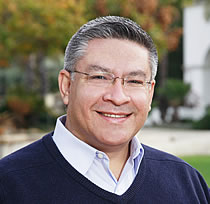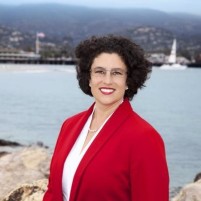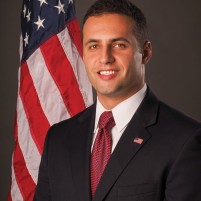Top fundraiser in congressional race has personal finance woes
February 20, 2016

Supervisor Salud Carbajal
By JOSH FRIEDMAN
The leading fundraiser in the District 24 Congressional race to replace retiring Lois Capps also leads the top four candidates in credit card debt and history of foreclosure notices and federal tax liens.
Republicans Katcho Achadjian and Justin Fareed and Democrats Helene Schneider and Salud Carbajal lead the field of candidates for the June primary and November general election. Achadjian, a member of the Assembly, tops early polls followed by Schneider, mayor of Santa Barbara; Salud Carbajal, a Santa Barbara County supervisor; and Santa Barbara businessman Justin Fareed.
Other candidates in the 24th District race include Republican Matt Kokkonen; Democrats William Ostrander and Jeff Oshins; and independents Steve Isakson and John Ubersax.
The 24th District consists of all of San Luis Obispo and Santa Barbara counties and part of Ventura County. Voter registration is 37 percent Democrat, 34 percent Republican and 23 percent decline to state.
California’s primary election is scheduled for June 7. The top two finishers, regardless of party election, will advance to the general election.
Carbajal has raised $1.38 million, the most among all candidates in the race. He has endorsements from Capps, House Minority Leader Nancy Pelosi and other high-ranking Democrats.
Carbajal and his wife previously had three federal tax liens filed against them, as well as two notices of default on their home. The unpaid tax balances on the three liens totalled nearly $11,000.
Carbajal’s liabilities include between $35,001 and $80,000 of credit debt, as of last spring. He also has between $15,001 and $50,000 of student loan debt from 1994.
Carbajal does not have any hard assets, according to his disclosure form. His primary asset is tax-deferred income from Santa Barbara County, of which he reports having between $93,009 and $345,000. The tax-deferred income is part of a savings program that supplements retirement earnings of county employees.
In 2014, Carbajal received a $78,790 salary from Santa Barbara County, according to his disclosure form. Transparent California, a database of public employee salaries, states he received $87,439 in base pay and $127,756 in total compensation that year.
Carbajal’s 2014 income also included $18,253 in “salary” from Great West Retirement Services. He did report receiving any income from the wealth management firm over the first quarter of 2015.
The 1978 Ethics in Government Act (EIGA) requires House candidates to file disclosures of their personal finances, including assets, liabilities and income. Other information candidates must disclose includes public and private positions they hold, agreements they have made with employers, gifts they have received and sponsored trips on which they have traveled.
Congress passed the EIGA following former President Richard Nixon’s Watergate Scandal and a congressional vote in which representatives raised their own pay. In 2012, Congress passed The STOCK Act, a bill intended to combat insider trading. The STOCK Act requires house members and certain employees to regularly disclose transactions of stocks, bonds and other financial instruments. Candidates must also report financial transactions of $1,000 or more.

Helene Schneider
Candidates are not required to report the mortgages on their personal homes. Also, federal regulations only require candidates to report credit card accounts with outstanding debts of $10,000 or more. The reporting forms require candidates to report in ranges, rather than specific amounts.
Democrat Schneider has one asset, according to her disclosure form. It is a condominium that generates $15,001 to $50,000 a year in rental income. Her mortgage on the property totals between $250,001 and $500,000. Schneider reported no other liabilities.
The city of Santa Barbara paid Schneider a salary of $55,095 in 2014, according to her disclosure form. She received about $85,000 in total compensation from the city, according to Transparent California. Her 2014 income also included a “self salary” of $7,000 from human resources company HRxpress, her disclosure states.

Katcho Achadjian
Unlike other candidates, Schneider did not report any bank accounts on her disclosure form. If a candidate and his or her spouse have more than $5,000 combined in checking and savings accounts, the candidate must disclose all accounts containing at least $1,000.
Achadjian’s disclosure form shows the assemblyman has by far the most assets among the four leading candidates. Achadjian owns a gas station business, as well as several residential, commercial rental properties and paper assets such as stock and bonds. His liabilities consist of mortgages on two rental properties and three commercial properties.
Achadjian receives approximately $100,000 in annual compensation from Sacramento. Additionally, he takes a five-figure salary from his gas station business and collects a pension of more than $35,000 from San Luis Obispo County. Achadjian was a SLO County supervisor prior to becoming an assemblyman.
Fareed is the vice president of his family business, Pro Band Sports Industries, which Fareed’s father founded in 1992. Fareed only received $5,000 in salary from the company in 2014. He received $25,000 in pay from the company over the first three or four months of 2015, according to his disclosure form.

Justin Fareed
Fareed’s assets include between $200,002 and $500,000 invested in wealth management firm Northern Santa Barbara Trust. Fareed reported no liabilities on his disclosure form.
Of the leading candidates, only Carbajal has been the target of recent enforcement action by the California Fair Political Practices Commission (FPPC). Last April, the FPPC fined the Santa Barbara supervisor and his campaign treasurer $7,500.
A Franchise Tax Board audit found Carbajal’s campaign failed to file three late contribution reports. The campaign also accepted a $15,000 cashier’s check that was not drawn on the bank account of the donor, according to the FPPC.
An FPPC database lists fines issued by the agency since 2014. The FPPC took no action against Schneider and Achadjian during that period. Fareed has not run for local or state office.
While he was not penalized, Achadjian did come under public scrutiny following a trip he took to Cuba in 2013. That year, Achadjian joined a group of legislators on a spring break junket with Darius Anderson, a powerful California lobbyist.
The FPPC opted to take no action after Achadjian’s office said the assemblyman paid his own way to Cuba.
Get links to local political news, like CCN on Facebook.






The comments below represent the opinion of the writer and do not represent the views or policies of CalCoastNews.com. Please address the Policies, events and arguments, not the person. Constructive debate is good; mockery, taunting, and name calling is not. Comment Guidelines